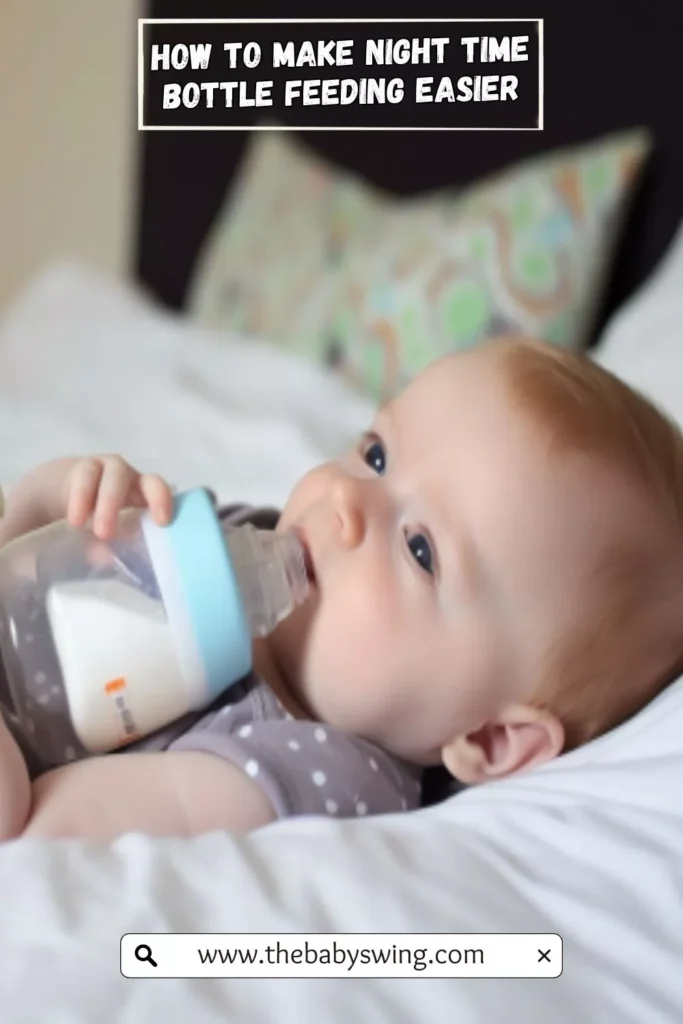Last Updated on October 30, 2023
Are you a tired parent struggling with night-time bottle feeding? We understand how challenging it can be to navigate those late-night feedings while trying to keep your little one content and yourself well-rested. That’s why we’re here to help you make night-time bottle feeding easier.
In this guide, we will share practical tips and strategies to streamline the process and ensure a smoother experience for both you and your baby.
From setting up a comfortable feeding station to preparing bottles in advance, we’ll cover everything you need to know to make those midnight feedings a little less exhausting. So, let’s dive in and discover how to make night-time bottle feeding a breeze!

How to Make Night Time Bottle Feeding Easier?
With some planning and the right approach, you can make the experience of feeding your baby formula at night more efficient and less disruptive. Here are some tips on the best way to feed your baby formula at night:
Prepare in Advance
Before going to bed, prepare the formula bottles by measuring the appropriate amount of formula powder and filling them with water. Store them in the refrigerator, so they’re ready to go when your baby wakes up hungry.
Keep Everything Within Reach
Place all the necessary items, such as bottles, formula, burp cloths, and a clean diaper, near your baby’s crib or bedside. This will save you time and prevent unnecessary trips to the kitchen or nursery during the night.
Warm the Formula Properly
If your baby prefers warm formula, use a bottle warmer or warm water bath to heat the prepared bottle. Avoid using the microwave, as it can create hot spots in the formula, which may burn your baby’s mouth.
Keep Some Water in a Thermos
Keeping a thermos filled with warm water near your bedside can be a time-saving hack. This way, you can easily prepare bottles without having to go to the kitchen or wait for tap water to reach the desired temperature. Having warm water readily available helps streamline the process, allowing you to swiftly prepare formula or mix it with expressed breast milk.
No products found.
Keep Your Bottles in a Cooler
Storing your bottles in a cooler nearby can save you precious time and effort during nighttime feedings. By having pre-measured formula or expressed breast milk readily available, you won’t need to fumble around in the kitchen or disturb your sleeping baby by preparing bottles from scratch. This convenience allows you to quickly attend to your baby’s needs and minimize disruptions to their sleep.
No products found.
Use a Formula Dispenser Machine
Investing in a formula dispenser machine can simplify nighttime feedings, especially when you’re on the go or have multiple nighttime wake-ups. These devices allow you to pre-measure formula powder into separate compartments, making it quick and easy to prepare a bottle. With a simple push of a button, you can dispense the correct amount of formula, reducing the risk of spills or measuring errors in the middle of the night.
No products found.
Room Share
Sharing a room with your baby during the first few months can greatly simplify nighttime routines. Having your little one close by enables you to respond promptly to their cries and cues without having to travel far. It promotes a sense of security for both you and your baby, fostering better sleep patterns for everyone involved.
Create a Calm Environment
Dim the lights and keep the room quiet and peaceful during nighttime feedings. This will help signal your baby that it’s time to relax and encourage them to fall asleep easily after their feed. Try to keep interactions with your baby to a minimum during nighttime feedings. Avoid unnecessary talking or playfulness to minimize disruption, and focus on creating a calm and soothing atmosphere.
Establish a Soothing Routine
Develop a gentle bedtime routine that includes feeding, burping, and cuddling. Consistency and predictability can help your baby feel secure and promote better sleep patterns.
Optimize Feeding Positions
Try different feeding positions to find the one that works best for you and your baby. Some babies may prefer being cradled in their arms, while others may find more comfort in an upright position.
Get Your Partner to Help
The support of your partner can significantly lighten the load and make nighttime routines more manageable. By alternating feeding responsibilities or taking turns soothing the baby back to sleep, both parents can get much-needed rest. This teamwork approach allows for shared responsibilities and ensures that both parents are involved in caring for their baby’s nighttime needs.
You Might Also Like These Resources!
Effective Ways to Feed Your Baby Formula at Night According To Expert

We sought advice from experts to discover the best way to feed your baby formula at night, sharing their insights for improved parenting.
Dr. Jane Morton, a pediatrician and breastfeeding specialist, suggests creating a breastfeeding-like experience. “Hold your baby close, make eye contact, and gently sway or rock them. This helps create a soothing environment that mimics the closeness of breastfeeding.”
“To ensure your baby’s safety and reduce the risk of choking and ear infections, it’s important to keep them in an upright position while feeding. Support their head and neck properly while holding them at a semi-upright angle. This also helps with digestion”, she added.
From another expert’s recommendation-Dr. Jennifer Shu, a pediatrician, and author, suggests, “To minimize nighttime disruptions, consider using pre-measured powdered formula packets or ready-to-feed bottles. This can make the preparation process quicker and easier, allowing you to feed your baby efficiently.”
“Don’t forget about burping!” Dr. Alan Greene, a pediatrician, stresses the importance of taking breaks during feeding to burp your baby. He states, “Take breaks during feeding to burp your baby, especially if they tend to be gassy or have reflux. This can help alleviate discomfort and improve sleep quality for both you and your little one.”
How Long Do Babies Feed on Formula at Night?
The duration of nighttime formula feeding varies from baby to baby and depends on various factors such as age, appetite, and sleep patterns. While there is no strict rule, it’s important to understand the general guidelines and adapt them to your baby’s individual needs.
Newborns often require frequent feedings, including during the night, as their tiny tummies can only hold small amounts of milk. They typically consume around 1-3 ounces every 2-3 hours, with some babies needing even more frequent feedings. As a result, nighttime formula feedings may be necessary every 2-4 hours during the first few weeks of life.
As babies grow, their stomach capacity increases, allowing them to consume larger milk volumes. By around 4-6 months, many babies can go for longer stretches without feeding during the night. At this stage, they might require one or two nighttime feedings, usually spaced out by 4-6 hours.
By 6-12 months, most infants are capable of sleeping for longer stretches without needing to be fed. Many babies can sleep through the night without requiring any formula feeding. However, some babies may still wake up once or twice for nighttime feedings due to hunger or habit. It’s essential to pay attention to your baby’s cues and adjust their nighttime feeding schedule accordingly.
FAQs
What if my baby still wakes up frequently during the night for feedings?
It is entirely normal for newborns and young infants to wake up frequently for feedings. Follow their cues and continue to provide nourishment as needed. As they grow older, their feeding patterns may gradually change.
Can I use a bottle warmer to make nighttime bottle feeding easier?
Yes, a bottle warmer can be a convenient tool to quickly and efficiently warm bottles. However, it is essential to follow the manufacturer’s instructions carefully and always test the temperature of the bottle before feeding.
Should I wake my baby for night-time feedings?
The need to wake your baby for night-time feedings depends on their age and individual needs. Newborns often require frequent feedings, and waking them may not be necessary. However, it is always best to consult with your pediatrician for guidance on establishing a suitable feeding schedule.
Is it normal for babies to fall asleep while bottle feeding at night?
Yes, it is quite common for babies to fall asleep during night-time feedings, as they find comfort in the feeding process. However, gently rousing them after feeding can ensure they have a full feeding before settling back to sleep.
Wrapping Up
Understanding how to make night-time bottle feeding easier is essential for parents seeking a smoother experience during those late-night wake-ups. By implementing strategies such as keeping bottles in a cooler, room sharing, involving your partner, keeping water in a thermos, and using a formula dispenser machine, parents can streamline the process and minimize disruptions to their baby’s sleep.
These techniques prioritize convenience, efficiency, and the well-being of both the baby and the parent. However, it’s important to remember that every baby is unique and that their needs may vary.
It’s always advisable to consult with pediatricians or trusted experts for personalized guidance based on your baby’s age, growth patterns, and overall health. With the right techniques and a little preparation, night-time bottle feeding can become a more manageable and peaceful experience, promoting a restful night’s sleep for both baby and parent.
Sharing is Caring!
You Might Also Like These Latest Content !
- How to get baby to sleep in bassinet instead of arms
- Can babies take cold formula
- How to make my baby sleep without rocking

Dr. Leah Alexander is a board-certified general pediatrician who has been in practice for over 20 years. She began working as a pediatrician at Elizabeth Pediatric Group of New Jersey in 2000. Since 2005, she has been working as an independently contracted pediatrician with Medical Doctors Associates at Pediatricare Associates of New Jersey. Read more
